Can Hamsters Have Scrambled Eggs? A Comprehensive Guide to Feeding Your Hamster
If you’re a hamster owner, you’ve likely wondered what foods are safe to feed your furry friend. One food that may come to mind is scrambled eggs. While hamsters are omnivores and can eat a variety of foods, including some types of protein, it’s important to know if scrambled eggs are a safe option.
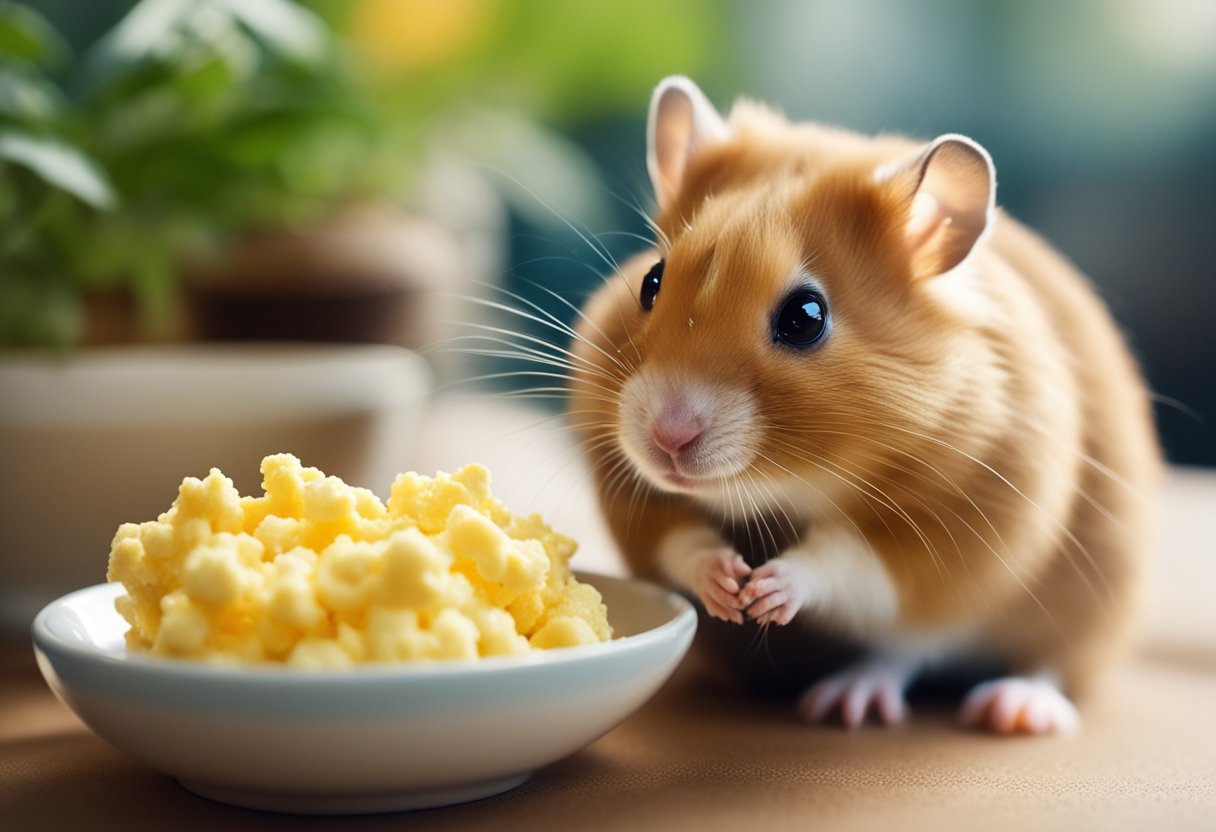
Hamsters have specific dietary needs that must be met to keep them healthy. A balanced diet for a hamster should consist of a good quality commercial hamster food, supplemented with fresh fruits, vegetables, and occasional treats. While scrambled eggs can be a nutritious treat for your hamster, it’s important to understand the risks and benefits before adding them to their diet.
Key Takeaways
- Hamsters have specific dietary needs that must be met to keep them healthy.
- Scrambled eggs can be a nutritious treat for your hamster, but should only be fed in moderation.
- It’s important to understand the risks and benefits of feeding scrambled eggs to your hamster before adding them to their diet.
Hamster Dietary Basics
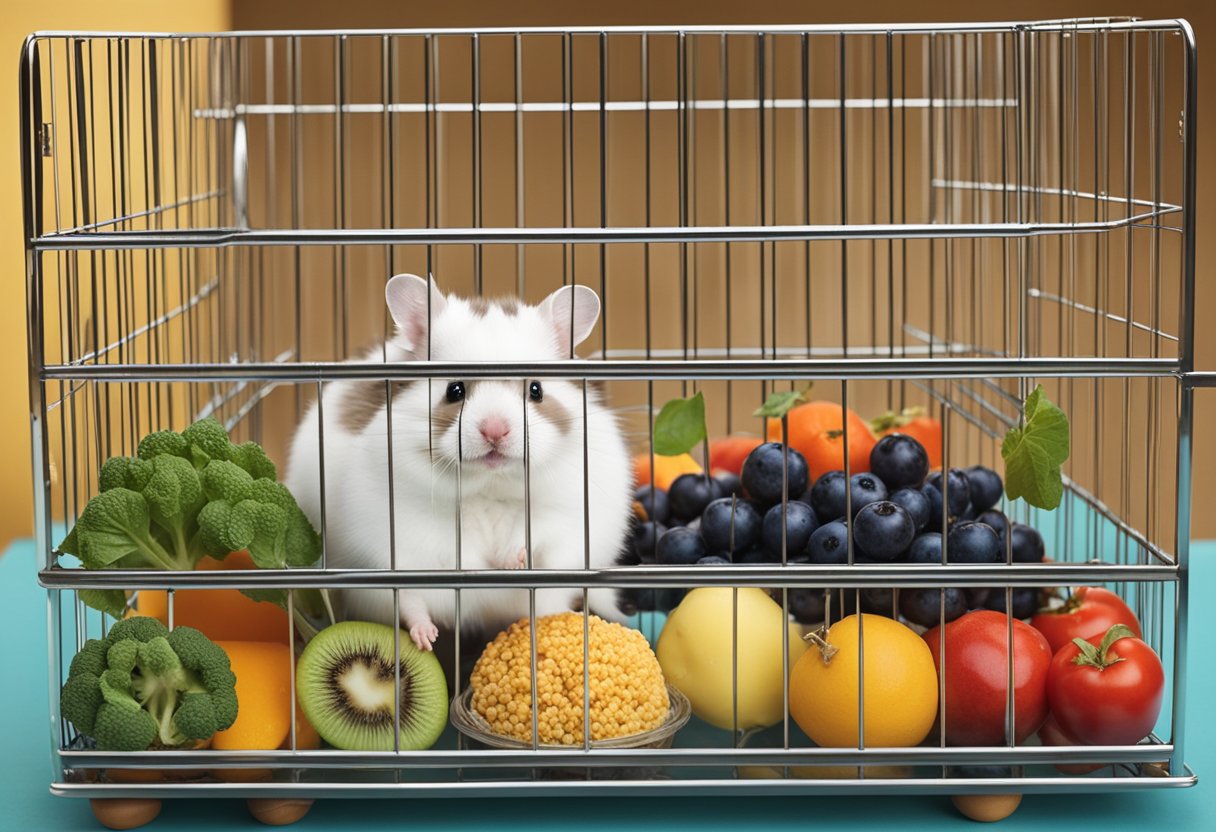
Hamsters are small, active, and energetic pets that require a well-balanced diet to maintain their health and vitality. In the wild, they are omnivores and eat a mix of seeds, fruits, insects, and vegetables. As a pet owner, it is your responsibility to provide your hamster with a healthy and nutritious diet that meets their unique nutritional needs.
Nutritional Needs of Hamsters
Hamsters require a diet that is high in protein, fiber, and fat, with moderate amounts of carbohydrates. They also need a variety of vitamins and minerals to maintain their health and prevent disease. A balanced diet for a hamster should consist of:
- High-quality hamster pellets: These are specially formulated to meet the nutritional needs of hamsters and should make up the bulk of their diet.
- Fresh fruits and vegetables: These provide essential vitamins and minerals and should be offered in small amounts as a treat.
- Fresh water: Hamsters need access to clean, fresh water at all times.
- Occasional treats: Hamsters enjoy treats such as small pieces of fruit, nuts, and seeds, but these should be offered in moderation.
Safe Foods for Hamsters
Hamsters can eat a variety of foods, but some are safer than others. Foods that are high in sugar, salt, or fat should be avoided as they can lead to health problems such as obesity, diabetes, and heart disease. Some safe foods for hamsters include:
- Fresh fruits and vegetables: Offer small amounts of fresh fruits and vegetables such as carrots, broccoli, and apples.
- Seeds and nuts: Hamsters love seeds and nuts, but they should be offered in moderation as they are high in fat.
- Cooked meats: Hamsters can eat small amounts of cooked chicken, turkey, or beef as a treat.
It is important to remember that hamsters have sensitive digestive systems and can be prone to digestive upset if their diet is not balanced or if they are given foods that are not safe for them to eat. If you are unsure about what foods to feed your hamster, consult with your veterinarian or a qualified pet nutritionist.
Overall, a well-balanced diet is essential for the health and well-being of your hamster. By providing your pet with a variety of safe and nutritious foods, you can help ensure that they live a long and healthy life.
Scrambled Eggs and Hamsters

If you’re a hamster owner, you might be wondering if it’s safe to feed your pet scrambled eggs. The good news is that eggs can be a nutritious addition to your hamster’s diet if fed in moderation. However, there are some things you should keep in mind before offering your furry friend scrambled eggs.
Benefits of Eggs for Hamsters
Eggs are a good source of protein, vitamins, and minerals that can benefit your hamster’s health. According to Hamster Care Tip, “Eggs provide protein, vitamins, and minerals that benefit hamsters when fed sparingly.” Protein is especially important for hamsters because it helps to build and repair tissues in their bodies.
Preparing Scrambled Eggs for Hamsters
When it comes to feeding your hamster scrambled eggs, there are a few things you should keep in mind. First, make sure to cook the eggs thoroughly to avoid any risk of salmonella. According to Small Pets 101, “never give them raw eggs because salmonella can.”
Second, avoid adding any salt, pepper, or other seasonings to the eggs. Hamsters have sensitive digestive systems, and these additives can cause stomach upset or other health problems.
Finally, be sure to feed your hamster scrambled eggs in moderation. According to Fluffy Tamer, “Scrambled eggs should be cooked plain, without added salt, pepper, or other seasonings.” Too many eggs can lead to obesity, digestive issues, and biotin deficiency.
Risks and Considerations
While eggs can be a healthy addition to your hamster’s diet, there are some risks and considerations to keep in mind. According to Hamster Guides, “Eggs contain high amounts of cholesterol, which results in specific health problems like obesity if consumed in excess.”
In addition, some hamsters may be allergic or intolerant to eggs. If you notice any signs of an allergic reaction, such as itching, swelling, or difficulty breathing, stop feeding your hamster eggs immediately and consult with your veterinarian.
In conclusion, scrambled eggs can be a nutritious treat for your hamster if fed in moderation and prepared properly. Remember to cook the eggs thoroughly, avoid adding any seasonings, and feed in moderation to avoid any potential health problems.
Resources
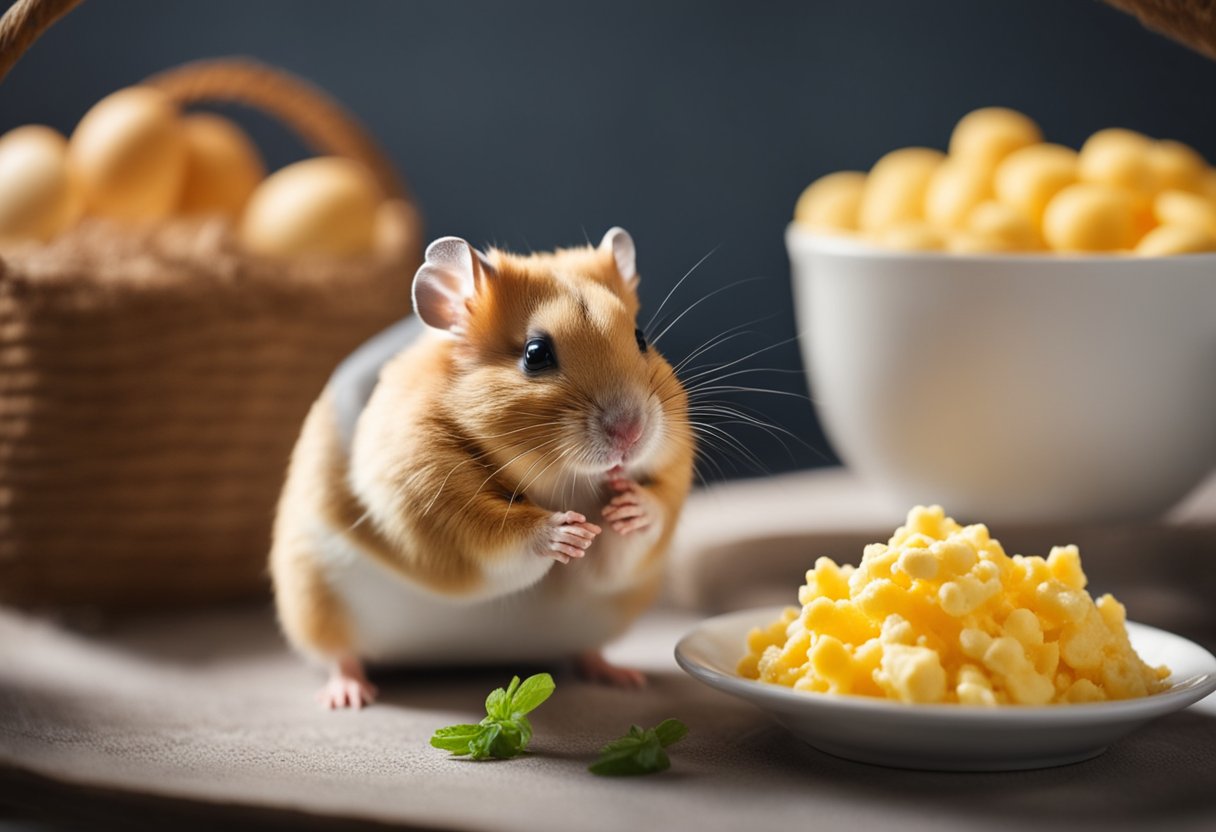
If you’re thinking about feeding your hamster scrambled eggs, it’s important to do your research first. Here are some resources to help you make an informed decision:
- Hamster Care Tip: This website provides a comprehensive guide on feeding scrambled eggs to your hamster. It covers the benefits, risks, and proper portion sizes for feeding eggs to your hamster.
- Hamster Guides: This website provides a nutritional guide on feeding scrambled eggs to your hamster. It covers the risks of feeding eggs to hamsters, such as obesity, and provides tips on how to feed eggs to your hamster in moderation.
- Fluffy Tamer: This website provides a nutritious guide for pet owners on feeding eggs to their hamsters. It covers the benefits of feeding eggs to hamsters, such as providing essential nutrients like protein, vitamins, and minerals.
- Pet Keen: This website provides a nutrition facts and FAQ on feeding eggs to your hamster. It covers the benefits of feeding eggs to hamsters, such as being an excellent source of protein, vitamin A, B vitamins, and iron.
Remember, it’s important to feed your hamster scrambled eggs in moderation as an occasional treat. Too many eggs may lead to obesity, digestive issues, and biotin deficiency. Always consult with your veterinarian before introducing new foods to your hamster’s diet.
Conclusion
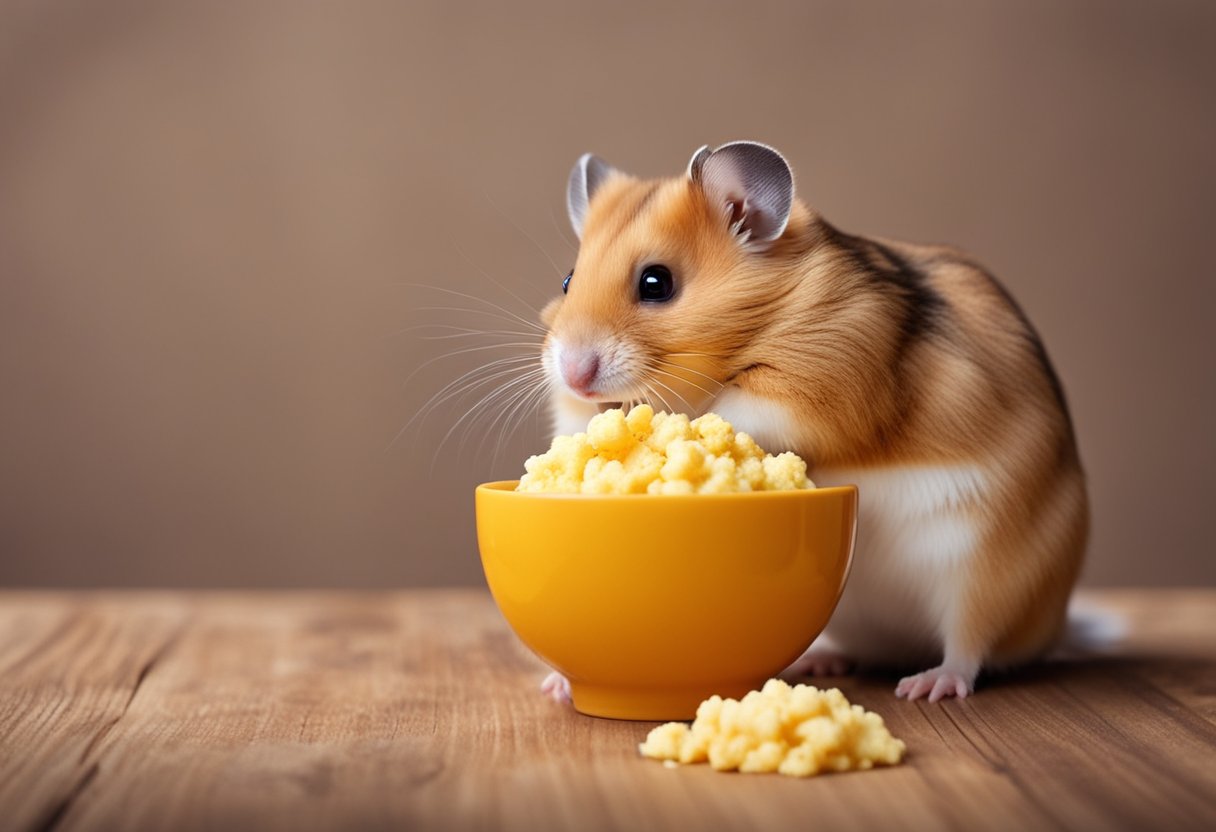
In conclusion, scrambled eggs can be a nutritious occasional treat for your hamster. They are a good source of protein and other essential nutrients that can contribute to your pet’s well-being when provided in moderation. However, it is important to note that hamsters should not rely on scrambled eggs as a primary food source.
When feeding scrambled eggs to your hamster, it is recommended to offer plain boiled or scrambled eggs without any added ingredients or flavors. Pan-fried eggs are not recommended as they can be high in fat and may cause digestive issues for hamsters.
It is also important to consider the portion size when feeding scrambled eggs to your hamster. Too many eggs may lead to obesity, digestive issues, and biotin deficiency. Consult with your veterinarian to determine how much food your hamster should eat each day.
Overall, scrambled eggs can be a healthy addition to your hamster’s diet when fed in moderation and as part of a balanced diet. Remember to always prioritize your pet’s health and well-being by providing a variety of nutritious foods and consulting with your veterinarian for any dietary concerns.
Frequently Asked Questions
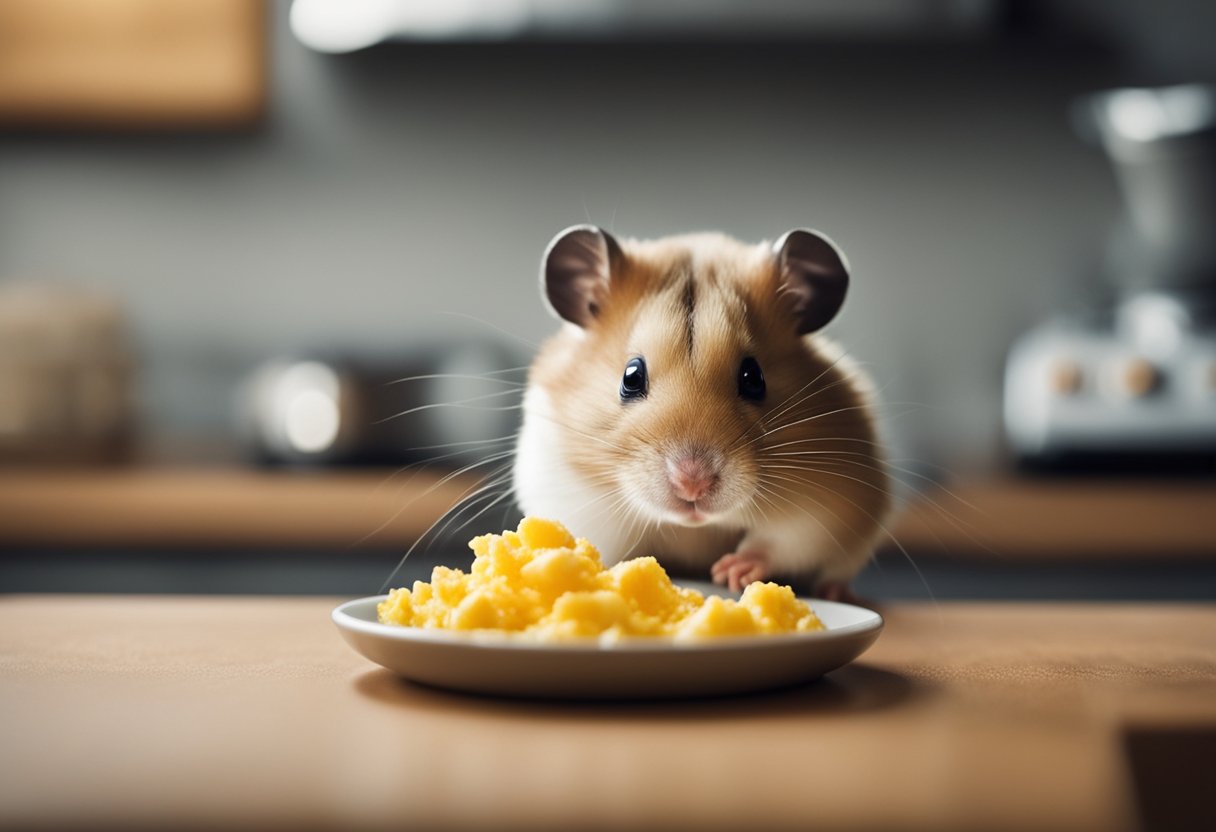
What types of cooked eggs can hamsters safely eat?
Hamsters can safely eat cooked eggs, including scrambled, hard-boiled, soft-boiled, and baked eggs. However, it is important to avoid feeding your hamster raw eggs, as they can contain harmful bacteria such as salmonella.
Are there any benefits to feeding hamsters scrambled eggs?
Scrambled eggs are a good source of protein, which is essential for a hamster’s diet. They also contain vitamins and minerals such as vitamin A, B vitamins, and iron. However, scrambled eggs should only be offered to hamsters as an occasional treat due to their high fat and cholesterol content.
How should scrambled eggs be prepared for hamsters?
Scrambled eggs should be cooked plain, without added salt, pepper, or other seasonings. It is also important to avoid using oil or butter when cooking the eggs, as hamsters do not require additional fat in their diet.
Can hamsters consume cheese or milk with their eggs?
Hamsters are lactose intolerant and should not consume cheese or milk. These dairy products can cause digestive issues and should be avoided.
What portion of scrambled egg is appropriate for a hamster?
A small amount of scrambled egg, about the size of a pea, is appropriate for a hamster as an occasional treat. It is important not to overfeed your hamster, as this can lead to obesity and other health issues.
Is the yolk of an egg safe for hamster consumption?
The yolk of an egg is safe for hamster consumption and can be a good source of protein and other nutrients. However, as with scrambled eggs, it should be offered only as an occasional treat and in small amounts.
